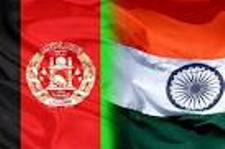India and Afganistan have a strong and friendly bilateral relationship. In 1980s, India was the only South Asian country to recognize the Soviet-backed Democratic Republic of Afghanistan. In 1990s, its relations with Afganistan had been on a negative front due to the Government of Taliban. In 2000s, India aided the overthrow of the Taliban and became the largest regional provider of humanitarian and reconstruction aid to Afghanistan. Currently Indians are working in various construction projects, as part of India's rebuilding efforts in Afghanistan and New Dehli is maintaining a strong relationship with Karzai administration. The relationship between India and Afghanistan received a major boost in 2011 with the signing of a strategic partnership agreement, Afghanistan's first since the Soviet invasion of 1979.
Khan Abdul Ghaffar Khan - An Afgani Pashtun Ghandhian
Khan Abdul Ghaffar Khan was a prominent Afgan-Pashtun leader of the Indian independence movement and active supporters of the Indian National Congress . Although the North-West Frontier Province became part of the Muslim state of Pakistan in 1947, active Pashtun support for the Indian freedom struggle led to great sympathy in India for the cause of Pashtun autonomy and freedom. The Indian government continued to support Pashtun leader Khan Abdul Ghaffar Khan in his quest for greater Pashtun freedom in the NWFP.
A Little Modern History
Following the withdrawal of the Soviet armed forces from Afghanistan in 1989, India and the international community supported the coalition government that took control, but relations and contacts ended with the outbreak of another civil war, which brought to power the Taliban, an Islamist militia supported by Pakistan, Saudi Arabia, and the United Arab Emirates. The rise of Islamism in Afghanistan and the proliferation of Afghan mujahideen in the militancy in Indian-administered Kashmir turned the Taliban and Afghanistan into a security threat for the Government of India. The destruction of the Bamiyan Buddha monuments by the Taliban led to outrage and angry protests by India, the birthplace of Buddhism. In 1999, the hijacked Indian Airlines Flight 814 landed and stayed in Kandahar in Afghanistan and the Taliban were suspected of supporting them. Thus India became one of the key supporters of the anti-Taliban Northern Alliance, lead by United States.
India and Karzai administration
After the overthrow of the Taliban, India established diplomatic relations with the newly-established democratic government, provided aid and participated in the reconstruction efforts. India has provided US$ 650–750 million in humanitarian and economic aid, making it the largest regional provider of aid for Afghanistan.India's support and collaboration extends to rebuilding of air links, power plants and investing in health and education sectors as well as helping to train Afghan civil servants, diplomats and police. India also seeks the development of supply lines of electricity, oil and natural gas. Also to give Afghan Students scholarships.
The Indian Army's Border Roads Organisation constructed a major road in 2009 in the remote Afghan province of Nimroz, connecting Delaram to Zaranj. This has given a viable alternative route for duty free movement of goods through the Chabahar port in Iran to Afghanistan helping reduce the Afghan economy's dependence on Pakistan.
In 2005, India proposed Afghanistan's membership in the South Asian Association for Regional Cooperation (SAARC). In 2007, Afghanistan finally became the eight member of SAARC. Both nations also developed strategic and military cooperation against Islamic militants. Thus India pursues a policy of close cooperation in order to bolster its standing as a regional power and contain its rival Pakistan, which is supporting Islamic militants in Kashmir and other parts of India.
A few notable quotes
"India is a brother country and the relationship between the two cannot be hampered by any enemy." : Afghan Foreign Ministry, in the aftermath of the 2008 Indian embassy bombing in Kabul.
"Pakistan is our twin brother, India is a great friend. The agreement we signed with our friend will not affect our brother." : Karzai, on signing the Strategic Partnership Pact with India in 2011.
"Tragically, the forces of terror and hatred have silenced yet another powerful voice of reason and peace in Afghanistan. We unreservedly condemn this act of great brutality." : Indian External Affairs Ministry on condemning the assassination of Chairman of the Afghan High Peace Council Burhanudin Rabbani in 2011.
PS : Based on Civil Service Mains General Studies Paper 2 syllabus : Foreign Affairs with special emphasis on India’s relations with neighbouring countries and in the region
sources






0 comments: